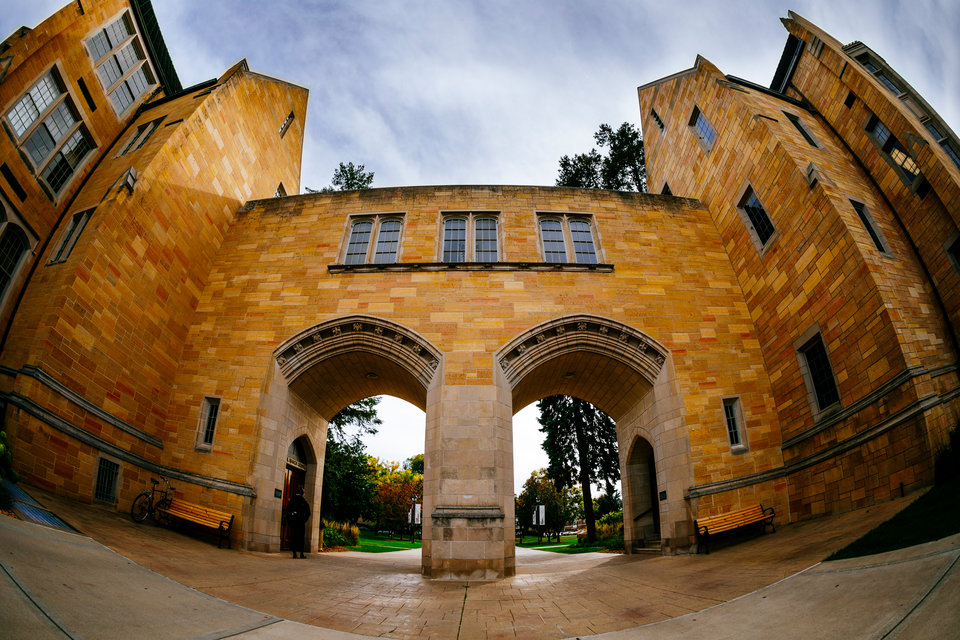Editor's note: Faculty and staff members of the St. Thomas Anti-Racism Coalition have sent a letter to President Julie Sullivan and the Newsroom calling for systemic change in response to the ongoing challenges our community faces. The president, provost, and entire university leadership team is committed to undertaking the short-term and long-term work needs to ensure this moment is a meaningful inflection point in stepping up our efforts to create and sustain a diverse and inclusive community that lives our fundamental value of respecting and promoting the human dignity of all. We look forward to collaborating with all in this vitally important work.
Dear President Julie Sullivan, Provost Richard Plumb, and the UST Community,
On October 19, 2018 an African American undergraduate student at the University of St. Thomas woke up to find the words “N***** Go Back” written on his dorm room door. Earlier in the year, this same student was approached by a group of white students outside of Ireland Hall and was told, “You don’t belong here.”
On October 21, 2018, Dr. Sullivan issued an email to the St. Thomas community with the subject line: “Racism will not be tolerated.”
The Black Empowerment Student Alliance (BESA) will organize both an open dialogue and a sit- in the week of October 22, 2018.
This sounds all too familiar.
Just less than two years ago, we were in the exact same position. Three students had written the n-word on a campus sidewalk, Dr. Sullivan issued a campus-wide email, and the campus held a rally of protest with over three hundred participants.
How is it that we find ourselves in the same place again?
We, the Anti-Racism Coalition (ARC), had been in the process of preparing an open letter to inform the community about our mission, the progress we have made, and the ongoing challenges our community faces, as well as actions we believe are required in order for real change to happen. With this most recent incident, we now feel an urgent need to share this letter immediately with the community, and to raise our community’s awareness of the fact that this is not an isolated incident. The University of St. Thomas has a systemic problem, and only a systemic, top-down and bottom-up solution can prevent incidents like this one from happening again and again.
Who We Are: A Brief History
The Anti-Racism Coalition (ARC https://antiracismcoalition.wordpress.com) was formed in 2015 and since then its members have worked continuously to help create a more equitable and inclusive campus environment, in keeping with the University of St.
Thomas's mission to promote the development of "morally responsible leaders who think critically, act wisely, and work skillfully to advance the common good."
In early 2016, members of ARC sent an open letter entitled “Support Our Students of Color” to the University of St. Thomas Administration. Excerpts from the 2016 open letter reflect the mission of the Anti-Racism Coalition:
As staff and faculty at the University of St. Thomas, we formed the Anti-Racism Coalition to serve our students of color who have courageously asserted their vision for an equitable and inclusive education that affirms their dignity as part of our human family. In concert with the growing student activist movement across the nation, UST students of color have been in dialogue with administration about their experiences of inequity on campus, and have clearly identified a list of recommendations that begin to address these matters.
We have respectfully called on our administration—whose leadership has offered a vision of a twenty-first century UST education that privileges diversity and inclusion—to begin immediate implementation of near-term projects that will have an impact on our students’ educational endeavors, and a long-term strategy to become an intentionally anti- oppressive and racially just community.
We reflect on President Julie Sullivan’s view of our university’s role in preparing ourselves for the contemporary needs in the world. Let us be the bridges to bring our community together to realize our collective capacity to advance the common good.
(For complete letter: Support Our Students of Color letter)
What We Have Done
Actions
During the last two years, members of ARC have worked to implement the following anti-racist actions so as to positively impact the UST institutional climate:
Teach-ins
In order to support the development of open dialogue regarding issues relating to race and social justice, members of ARC have led a number of teach-ins. The primary audience is students, and these events are intended to create a space for informed discussion of timely topics that have the potential to generate intense and lively debate.
- Philando Castile: Protest and Racial Injustice (October, 2016, 91 in attendance)
- Dakota Access Pipeline Protests (November 2016, 78 in attendance).
- Inaugurating Justice for the Common Good – Open mic event with poster making and slideshow featuring the "art of resistance." (January 2017, 70 in attendance)
- Rethinking Immigration: Beyond Walls and Borders (February 2017, 97 in attendance)
- Open letter on Anti-Semitism and Islamophobia (April 2017) followed by the Anti- Semitism and Islamophobia Program Series: Racism and Freedom of Speech (May 2017, 20 in attendance)
- Preventing Burn Out and Sustaining Anti-Racist Efforts – a forum for UST students of color and white anti-racist accomplices to share strategies (April 2017, 25 in attendance and September 2017, 50 in attendance)
- RACE & RACISM: Questions You're Afraid to Ask – a forum for UST students to engage in dialogue without worry of being politically correct (May 2017, 50 in attendance and October 2017, 100 in attendance)
- From Awareness to Advocacy: Dismantling Racism at UST (May 2017, 15 in attendance)
- Taking a Knee: Kaepernick, Race, and the Politics of Disruptive Protest (October 2017, 72 in attendance)
- Art, Identity, and Representation on Campus (April 2018, 35 in attendance)
Curriculum and Faculty Development
- Members of ARC drafted an open letter to urge the Educating for the Future (EFF) strategic task force to increase the rigor (from 51% to 100% in content) in the newly proposed Diversity, Inclusion, and Social Justice (DISJ)-flagged courses requirements. However, EFF responded that they wanted to maintain the proposed 51% content. (October, 2017). An amendment to increase the content coverage was proposed and voted against by the Senate (April, 2018).
- Members of ARC held a Faculty Forum on Teaching Race in the Classroom: This interactive workshop addressed issues such as: why we need to teach race in the classroom at UST, how anti-racist pedagogy is part of UST’s mission, what it means to be a white instructor teaching about race at a predominantly white institution, and how to teach about white supremacy as a structural norm, as opposed to an exception to the norm (October 2017, 150 in attendance).
- With the Center for Faculty Development, members of ARC organized and led a panel/workshop as part of the Inclusive Classroom Institute called “Race, Racism, Privilege” in order to share pedagogical approaches and resources on addressing privilege, power and racism with other faculty members from across the university (March 2017, approximately 40 in attendance and November 2017, approximately 15 in attendance).
- Members of ARC led a Faculty Learning Community on teaching faculty how to introduce race, racism, and racial intersections into predominantly white classrooms as well as racial justice pedagogy and intersectionality (AY 2015-2017, 51 registered over 3 years).
Other Events:
- Members of ARC have created and displayed anti-racism signs at the March through Arches to support incoming students (September 2016, 2017, 2018).
- On November 4, 2016, members of ARC co-organized a campus-wide rally after three students marked the n-word on a side walk on UST’s St. Paul campus. Approximately 300 students, faculty, and staff members were in attendance.
Why We Write Again: Ongoing Challenges
Despite these actions, our community has been continuously challenged by and associated with overt racist incidents and acts of systemic and institutional racism in recent years, as well as a sense that our campus is unwelcoming to students, faculty, and staff of color:
- In April 2016, the St. Thomas men’s hockey team posted offensive cultural stereotypes pertaining to the Latino community on social media.
- In November 2016, three St. Thomas students marked the n-word on a campus sidewalk.
- In April 2017, Allen Scarsella was sentenced to 15 years in prison for shooting and wounding 5 men at a protest of Jamar Clark’s killing in Minneapolis in 2015. Allen was a recent St. Thomas graduate.
- In November 2017, the n-word was found on a bulletin board in the Ireland residence hall next to a black student’s “About Me.”
- In November 2017, flyers saying “It is okay to be White” were found scattered around the St. Thomas campus. Posting these flyers was a part of a country-wide campaign rooted in White nationalist ideologies. Volunteer members of the community replaced the flyers with messages such as “It is okay to be human” or “It is okay to be (blank).”
- In November 2017, the Committee on Teaching Evaluation analyzed over 25,000 sets of St. Thomas faculty members’ IDEA teaching evaluations between Fall 2009 to Spring 2017, and found that there was there was a statistically significant difference in the scores between White faculty and faculty of color in all areas of evaluation. A full report from the CTE was presented to the faculty in the Fall 2018, and this demonstrated a measurable bias in favor of White faculty members.
- Based on the Faculty Handbook’s section on “Using the IDEA System for Summative Purposes, both for Annual Evaluation and Tenure and Promotion,” the preliminary results provide strong evidence that the IDEA scores not only have negatively affected faculty of color’s annual merit pay, but their tenure and promotion. Given that there is no evidence that faculty of color are innately less effective in teaching, and the University’s mandate of directly linking the IDEA score to faculty’s teaching evaluation – a significant part of the annual evaluation – the persistent pattern of lower evaluations for faculty of color lends evidence of systemic prejudice and discrimination against faculty of color, disproportionally disadvantaging faculty of color’s career advancement and financial income.
- In February 2018, a poster was found in the student residence hall depicting immigrants in a demeaning way.
- Over the last several years, students participating in Teach-Ins have frequently voiced their desire for faculty to use the classroom setting to work with students to grapple with issues of race and injustice. At the same time, many faculty members feel ill-prepared to do so for a variety of reasons. For example, some faculty report that their curriculum is too fixed to allow for spontaneous discussions about current issues, or that they do not have the time and space for creative innovation or serious immersion in matters dealing with injustice and inequality. Some faculty find it is too great of a risk to bring up contentious topics in the context of an institution that places a heavy emphasis on student perception of success (IDEA evaluations). In addition, students and faculty alike have expressed concerns about the need to maintain rigor in our classes that meet the core requirements.
- On October 19, 2018 a black undergraduate student at the University of St. Thomas woke up in their residence hall to find the words “N**** Go Back” written on their door. Earlier in the semester, this student was also approached by a group of white students outside of Ireland Hall and was told, “You don’t belong here.”
What Now? Call for Further Actions
We must recognize the concerted efforts that the community, particularly our leaders in the administration, have made in the past few years in addressing the lack of inclusion on our campus. The challenges we face are part of the legacy of long-tradition of racism deeply rooted in this country. However, we must also recognize that some of these challenges can be addressed by stronger anti-racist actions on the part of our institution.
Therefore, we ask the St. Thomas community, particularly our leaders in the administration, to acknowledge these on-going challenges as barriers to a diverse, inclusive and equitable campus. We want to emphasize the responsibility of our leaders in the administration for implementing an institution-wide anti-racist agenda. We ask our leaders to take concrete action steps, including but not limited to:
- CURRICULUM: Increase the rigor of anti-racist curriculum to educate students throughout their education experience at St. Thomas. Curriculum is one of the most, if not the only, powerful way to educate our students for the future.
- EVALUATION: Work to develop ways to incentivize faculty to engage in anti-racist pedagogy, research, and service work at UST, modeling evaluation procedures from other institutions that require evidence of work related to diversity and inclusion in their annual reports and tenure and promotion materials.
- POLICY: Re-examine employee and student conduct policies. Execute firm administrative actions against any individual level racist events, reported by community members. Make the procedures transparent, and truly hold the offenders accountable, regardless of their rank or status.
- POLICY: Radically change the annual evaluation policies that have systematically and are still negatively affecting racial minority faculty’s annual evaluation, merit pay, tenure and promotion.
- COMMUNICATION: Conduct campus climate survey regularly (the last climate survey was in 2013), and share with the community the results as well as actions to take.
- RESOURCES: Devote more resources and support, including additional staffing, to the Office of Institutional Diversity so that it may play a stronger role in improving the community’s climate, and provide more support for a wider range of faculty and staff training on anti-racism.
In the spirit of St. Thomas’ mission statement and conviction to diversity and inclusion, instead of dismissing or denying the responsibility of anti-racism, we must embrace these challenges, honestly and bravely.
It is our hope that with these active anti-racist efforts one day our faculty, staff, and students of color will no longer feel marginalized, but rather included and valued as equally as their white colleagues, classmates, teammates, and roommates.
Members of ARC will continue its work, because to be free from racism is not a simple ideal, but an essential right for every dignified human being, and upholding this right is the responsibility of everyone in our community.
Sincerely,
Anti-Racism Coalition (representing over 100 faculty and staff members at the University of St. Thomas)







